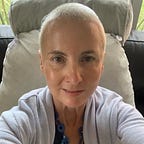Navigating Covid Metastasis
After nearly a million deaths in US alone, here’s the deal, Covid will NEVER be endemic. And it truly troubles me that the media and even some scientists and public health officials are beginning to speak about it that way. Add to that the fact that many vacation and gathering places (including Bermuda and Mexico) are dropping restrictions just as the weather gets calmer and families want to run towards the sun after months at home. That is just DUMB, not to mention, confusing for those who need clear consistent messaging from our leadership, not a free-for-all of nonsense like the beginning of Covid 2 years ago.
On the other hand, I don’t think Covid should be treated as an on-going “epidemic” or “pandemic either.
Those terms invoke panic, herd mentality, division, derision, hatred and intentional misunderstanding, it would seem.
Instead, I think Covid should be seen as a Metastatic condition. One where general rules of conduct are maintained, like mask-wearing in enclosed spaces when you don’t know everyone else, frequent hand-washing, and immune-boosting as frequently as updates are available.
The reason I say this is because I am someone who has lived with metastatic cancer for almost 6 years now. And I can tell you firsthand that this virus is behaving more like cancer cells searching for a new place to live, grow, change and spread again than it is like the flu or the “common cold”. To put it in military terms, this is guerrilla warfare, not a leveling out. Much like ISIS, the brilliance behind “smart” diseases and viruses is that they hack the system we rely on just enough to weaken it without complete collapse, so we continue to keep working it blindly expecting it to keep going despite the cracks.
For example, after my brain cancer surgery, my oncologists kept looking at my head, because the rest of my body looked and behaved perfectly. I traveled the world from New Zealand to Slovenia to Patagonia, climbing mountains and running marathons, until literally the 25th mile of the New York City marathon, 18 months later, when suddenly my breathing changed. But it wasn’t until 6 months after that, when I again running, training for another race that I felt something pushing into my lungs. By that time, the metastatic tumor on my right adrenal gland was so large I could feel it in my lungs, 5 inches away. And it was too late. Too late for surgery, treatment and a positive prognosis. Yes, Sloan Kettering did everything under the sun to “kill” my cancer, dropping bomb after bomb on me during the process. And yes, I did survive the treatment and subsequent surgery. But the story of metastasis doesn’t end there. The treatment I endured started deteriorating my bone and muscular tissue as well making me more vulnerable conditions like diabetes heart disease, Parkinson’s and many other conditions we don’t like to talk about.
But the fact is, I’M STILL HERE! And the reason I’m still here is because I want to be here, and I took my condition seriously. I completely changed my diet, I eliminated sugar and all its inflammatory derivatives like dairy, breads, soy, red meat, and most other things that trigger our bodies to overproduce self-destructive hormones. I also paid a lot more attention to my personal habits, like prioritizing my sleep hygiene, like I did my diet. And I’m happier and healthier for all of that.
I know no one wants Covid to stick around. We all “want to go back”, but the truth is at least in my mind, the only way to enable a positive and productive future, where we can live with expectations of travel and fun is to keep our precautions in mind, and not let complacency set in. Or it might be too late to save the next million American lives.
Holly Lynch is a 20+ year ESG and DEI communications veteran, board member, strategist and investor who has helped individuals and companies tackle the toughest challenges, transitions and transformations in their worlds. Having survived countless life setbacks and two rounds with terminal cancer, while seeing the country-wide collapse of the systems and safety nets for the most vulnerable in and outside our communities, she is now shifting her life and career trajectories to focus on coaching and consulting with those facing down fundamental shifts and transitions as they try to adapt to change while rebuilding their lives and businesses during these unprecedented times.
